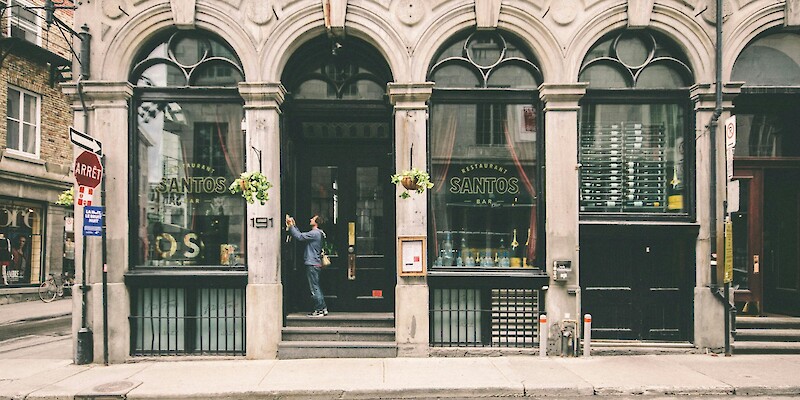Whether you're seeking to purchase new trading premises, expand your rental investment portfolio, or buy an established business, a commercial mortgage can offer the financing you need.
In this guide, we'll explore how commercial mortgages work, the steps to obtain one, and key considerations to keep in mind before applying. This will help you make informed decisions when financing commercial property or business ventures.
What is a commercial mortgage?
Commercial mortgages, also referred to as business mortgages, are designed for purchasing property that is not used for residential purposes. This can include:
- A buy-to-let property that you intend to lease to a business.
- A commercial property, such as retail shops, office spaces, or warehouses, which you plan to either let to tenants or use for your own business operations.
Or, you could also use one to fund:
- A remortgage on a commercial property you already own.
- Renovation of your existing investment portfolio or trading premises.
- Purchase of commercial plant, stock, or vehicles for business operations.
- Acquisition of an established business.
Similar to regular mortgages, commercial mortgages are typically repaid over a longer period than traditional business loans. However, interest rates are usually higher. A key benefit is that repayments can often be deducted from your taxable profits, as they are considered an associated business expense.
Commercial mortgage terms can extend up to 40 years, though it's common to borrow over a shorter period, depending on your business requirements. Additionally, arrangement fees for commercial mortgages are typically higher than those for residential mortgages, usually around 2% of the loan value.
How do they work?
Commercial mortgages are much more customised than traditional residential mortgages, as they are tailored to meet the specific needs of your business rather than being "off-the-shelf" products.
Unlike residential mortgages, most business mortgages are unregulated, meaning lenders are not bound by the Financial Conduct Authority’s rules. This allows lenders more flexibility in creating bespoke deals and gives you greater room for negotiation.
Fewer high street lenders offer commercial mortgages, and those that do often have stricter criteria. Therefore, it’s advisable to explore specialist lenders.
What types of commercial mortgages are available?
As mentioned, commercial mortgages are tailored to specific purposes, and lenders often categorise them accordingly. Depending on your needs, you might require one of the following:
A Commercial investment mortgage (Or Buy-to-let)
This type of mortgage is used to purchase or remortgage a property you plan to let for profit, typically for business purposes. It can also apply to certain residential buy-to-let properties, such as large Houses of Multiple Occupancy (HMOs) or student Multi-Unit Freehold Blocks (MUFBs).
Owner-occupier commercial mortgage
This mortgage is used when you intend to purchase a property for your own business operations or trading purposes.
Semi-commercial mortgage
Designed for mixed-use properties, semi-commercial mortgages apply to buildings that have both residential and business tenants. An example would be an apartment block with retail units on the ground floor.
Eligibility criteria
Criteria for commercial mortgages are typically stricter with high street lenders, but specialist commercial lenders can offer more flexibility, often allowing you to secure the loan with assets rather than a cash deposit. Typically, you will need:
- At least 25% deposit: Although it may be possible to borrow up to 100% loan-to-value (LTV) if you secure the loan against high-value assets.
- A business plan: This should demonstrate your industry experience, outline profitability, and explain how you plan to repay the loan. If you're purchasing a property to let, you'll also need to provide projected rental income figures.
- A decent credit history: This applies to both the business and its directors if borrowing under the business name. While bad credit may complicate things, deals can sometimes be arranged on a case-by-case basis due to the bespoke and flexible nature of commercial lending.
How to get a commercial mortgage
When applying for a commercial mortgage, it's highly recommended to consult with a broker, who has experience in this type of finance. You’ll need to prepare a strong business plan tailored to the proposed use of the property or business you intend to purchase, similar to how you would prepare when bidding for a project.
Speak to a commercial mortgage expert to explore how they can help you unlock the financial potential in your business.
Property types you can invest in
There are numerous investment opportunities available, whether you aim to rent to residential or business tenants, or both. These include, but are not limited to:
- Retail premises
- Factories
- Warehouses
- Leisure facilities, such as pubs or gyms
- Offices
- Public service buildings, such as healthcare facilities or colleges
- Places of worship
- Hotels, guest houses, and B&Bs
- Farms and agricultural land
- Mixed-use properties
Commercial mortgage calculators
Commercial mortgage calculators are rare because affordability is assessed on a case-by-case basis. Most lenders evaluate your earnings before interest, taxes, depreciation, and amortisation (EBITDA) to gauge the business's operating profit, which helps determine how much they are willing to lend. However, some lenders may take a more customised approach, considering additional factors.
Due to the wide range of considerations, it’s too complex for an online calculator to accurately determine how much you could borrow with a commercial mortgage. While our mortgage repayment calculator can help you estimate repayments once the specifics of your loan are known, there isn't an online calculator available that can calculate the potential loan amount for commercial mortgages. Consulting a broker is the best way to understand what you might be able to borrow.
Which lenders are available?
We work with a broad range of commercial lenders, including well-known high street names such as HSBC and Santander, as well as specialist finance companies like Lendinvest.
The best lender for you will depend on your specific needs and circumstances. Your broker will be happy to provide tailored recommendations based on which lender will offer the most beneficial terms for your situation.
Frequently Asked Questions
It may be possible to borrow up to 100% of the property’s value if you can secure the loan against high-value freehold assets, such as property or land. However, borrowing at this level carries more risk, so interest rates will typically be higher to reflect that.
Securing a higher LTV can be easier if you have a "quality covenant," meaning a long-term, reliable tenant like a public body. In general, though, the maximum loan-to-value (LTV) for commercial mortgages is typically around 65-75%.
















